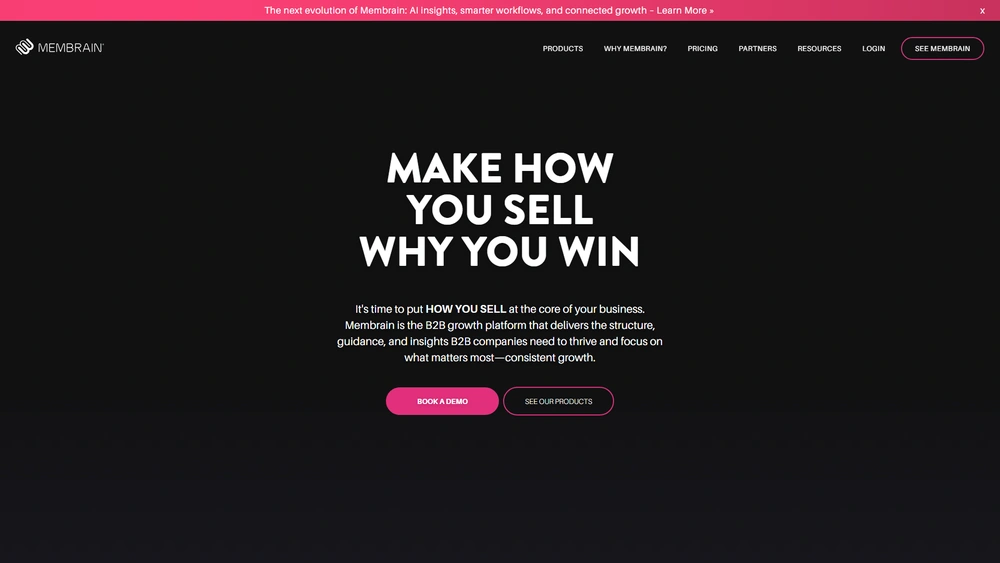Membrain Overview & 2026 Industry Position
Membrain is a purpose-built B2B sales enablement platform that stands apart from traditional CRM systems in 2026. Unlike its more rigid, data-heavy big-name counterparts, Membrain adds context, coaching, and collaboration to the CRM experience. Designed for complex B2B sales environments, it combines process-driven functionality with visibility tools that help sales teams improve both performance and consistency. In a year where AI and automation are reshaping every corner of enterprise tooling, Membrain’s deeply human-centered approach—supplemented by intelligent suggestions instead of automation overkill—makes it a compelling choice for businesses looking to strike the right balance between intelligence and intuition.
From Launch to 2026: Membrain’s Journey
Membrain began as a passion project in 2012, founded by George Brontén with a mission to build a more human sales system. Dissatisfied with existing CRMs that focused narrowly on data entry rather than strategy or coaching, Brontén set out to create a platform that empowers B2B sales teams to grow systematically. Membrain’s early versions concentrated on enabling consultative selling through workflow customization and training modules.
- 2012: Membrain is officially launched.
- 2014: Introduces sales process visualization and coaching modules.
- 2016: Launches Performance Insights dashboard—an early data visualization feature.
- 2019: Adds native collaboration tools and activity tracking enhancements.
- 2021: Integrates machine learning for suggestion engines.
- 2023: Expands partnerships for integrations with HubSpot, Salesforce, and ActiveCampaign.
In 2026, Membrain’s strategy centers around enabling smarter, AI-augmented workflows while preserving the context-rich, guided selling experience that makes it uniquely usable across complex B2B organizations.

Membrain Key Features
Membrain’s distinguishing features are tightly focused around complex B2B sales workflows. Here’s what sets it apart:
- Sales Enablement Engine: Custom process templates, enablement content delivery, and visual coaching prompts built into the workflow.
- Performance Insights: Real-time analytics tied to process adherence and behavior, not just outcomes.
- Coach Execution: Guided, embedded coaching with triggers, prompts, and feedback loops tied to live sales stages.
- Dynamic Playbooks: Built-in playbooks that adapt based on opportunity characteristics and lifecycle stages.
- Collaboration Spaces™: Shared spaces that keep sales managers, reps, and stakeholders aligned on key deals.
- AI Suggestions (2025): Context-aware action suggestions and email framing guidance powered by newer AI modules.
Workflow & UX
Membrain is not just intuitive—it’s guidance-forward design makes it even more accessible for new reps and veteran team members alike. The dashboard is clean and task-focused, prioritizing decision support rather than information overload.
Users enjoy customizable sales ‘Templates’ and Playbooks that structure calls, meetings, and follow-ups with auto-reminders triggered by deal stage movement. Color-coded timeline views help sales leaders spot risk zones and coaching opportunities long before pipeline issues occur.
Pro Tip: Onboard new reps faster by building role-specific dashboards using Membrain’s Sales Process Designer—repeatable success without complexity.
Membrain Pricing Analysis & Value Metrics
Membrain pricing as of July 2026 is subscription-based and centers around core platform access, with modular add-ons available for enhanced functionality. Here’s a breakdown:
| Plan | Monthly Price/User | Key Inclusions |
|---|---|---|
| Starter | $49 | Sales process design, basic dashboards, activity tracking |
| Professional | $79 | Playbooks, embedded coaching, pipeline analytics |
| Enterprise | $119 | AI module, integrations, admin controls, premium support |
Value Notes: While it costs more than basic CRMs, Membrain provides substantially higher ROI for complex B2B sales teams prioritizing consistency, coaching, and visibility.
Competitive Landscape
Compared to other CRMs and sales enablement platforms, Membrain’s consultative, coaching-first model shines in specific B2B contexts.
| Platform | Strengths | Weaknesses |
|---|---|---|
| Membrain | Guided selling, coaching tools, process-centric workflows | Higher cost, smaller ecosystem |
| HubSpot | All-in-one marketing/sales, automation tools | Rigid sales modules |
| Salesforce | Highly customizable, universal compatibility | Steep learning curve, complexity |
| Pipeliner | Sales visualizations, clean interface | Limited integrations |
Use Cases
Membrain excels in organizations that manage high-value, multi-touch, or long-cycle B2B deals. Ideal verticals and segments include:
- Enterprise software sales teams
- Industrial sales with complex quoting
- Consulting and professional services firms
- Medical tech and pharma with stakeholder-rich buying pathways
- Private equity backed portfolios that prioritize scalable forecasting
Membrain Integrations
Membrain actively supports integration with a range of tools across CRM, communications, email tracking, and admin/business productivity:
- CRM Integrations: HubSpot, Salesforce, ActiveCampaign
- Email Providers: Gmail, Outlook
- Calendar Sync: Google Calendar, Office 365
- Business Tools: Zapier, Make, Slack, MS Teams
Its open API, combined with a growing native integration library, ensures it can embed into most sales enablement stacks without friction.
Pros & Cons
- Pros:
- Built for complex B2B sales—not repurposed B2C CRM
- Embedded coaching and consistent enablement tools
- Impressively clean, zero-clutter UI
- Intelligent insights without over-automation
- Excellent sales process customization
- Cons:
- Not ideal for transactional or small-ticket B2C businesses
- Pricing may deter small early-stage startups
- Learning curve when mapping legacy processes
Final Thoughts
Membrain shows that CRM in 2026 can still be inherently human, even in an age of AI acceleration. It succeeds by narrowing in on what makes B2B sales unique: complexity, team alignment, and the necessity of guided seller behavior. For mid-to-large sales organizations looking for smarter processes rather than just more automation, Membrain offers a reliable, context-rich platform worth serious consideration.
Membrain FAQ
Membrain emphasizes guided sales workflows and embedded coaching instead of raw data entry. It’s built around methodology rather than reporting structures alone.
No, Membrain focuses purely on sales enablement and CRM. It integrates with marketing tools like HubSpot for automation needs.
Implementation typically takes 2 to 6 weeks depending on sales process complexity, integrations, and user training plans.
Yes. Membrain supports communication integrations with Slack and Microsoft Teams through native or API pathways.
Yes, Membrain offers a mobile app for iOS and Android that includes task tracking, notifications, and opportunity management on the go.

